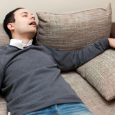Anxiety Depression Is a Common Disorder
Anxiety Depression can occur when you feel anxious about something that happened or is happening in your life. There is situational anxiety, such as becoming nervous before an airplane trip or driving on icy roads, but these situations are temporary and will probably disappear soon after the situation is resolved.
Today’s volatile economy can be a cause of anxiety depression. When you see your life savings dwindling and you know that you’re going to have to work a few or many more years before retiring, it can bring about anxious feelings that may lead to full blown depression.
Anxiety and depression are different disorders, but the people who suffer with anxiety often experience symptoms that are close to those of depression, such as irritability, extreme nervousness, trouble sleeping and focusing at work or at a task. Some people develop depression from the anxiety disorders they’ve experienced in the past.
Panic attacks are common in people who experience anxiety and can, in itself, cause depression. Panic attacks are like facing some type of horror in your life every day. As Jim Ballenger, an expert on anxiety disorders says, “If you’re facing terror every day, it’s gonna bring Hannibal to his knees!” Panic attacks are debilitating and can even harm your health, so they should be reported to your doctor and a plan of action taken immediately.
Anxious panic attacks can descend upon you without warning and leave you out of control, confused and overwhelmed, leading you to restrict your life severely. Some people have such severe panic attacks that they can’t drive, work, socialize with others or leave the house. Depression can set in if not treated and further debilitate the person.
Certain types of behavioral therapy can often be used to treat anxiety depression, but if the depression becomes worse medication, along with behavioral therapy, can be used in tandem. In some cases of anxiety depression, the causes could include a brain chemistry malfunction. When the chemistry of the brain isn’t balanced, a chronic form of anxiety often sets in, causing a “fight-or-flight” mechanism to trigger.
This constant state of anxiety is like being in extreme fear 24/7. Imagine how you feel in a nightmare when something is stalking or threatening you some other way. You wake up with your heart beating fast and breathing heavy, but it goes away almost immediately. No one can live in a constant state of fear without it taking a toll, and that toll could be the onset of depression.
Because anxiety and depression are so closely related they’re often called “the fraternal twins of mood disorders,” and are treated together. The good news is that anxiety depression disorders can be treated very effectively.
Anxiety Depression Treatments And Guides








